新现西课后答案 第11课
- 格式:pdf
- 大小:157.54 KB
- 文档页数:6
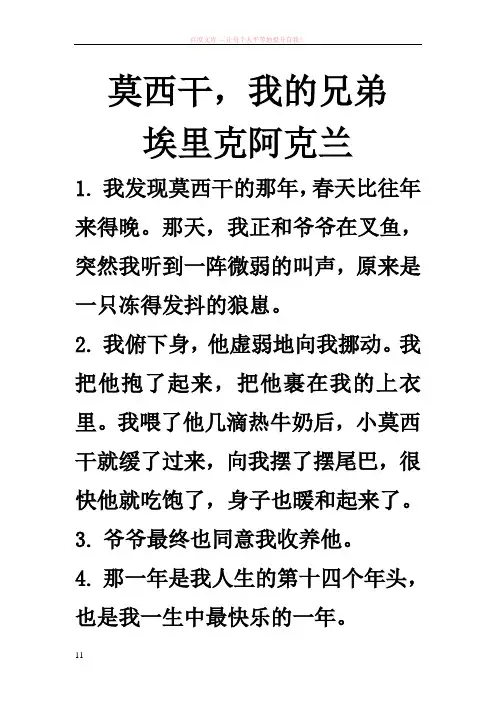
莫西干,我的兄弟埃里克阿克兰1.我发现莫西干的那年,春天比往年来得晚。
那天,我正和爷爷在叉鱼,突然我听到一阵微弱的叫声,原来是一只冻得发抖的狼崽。
2.我俯下身,他虚弱地向我挪动。
我把他抱了起来,把他裹在我的上衣里。
我喂了他几滴热牛奶后,小莫西干就缓了过来,向我摆了摆尾巴,很快他就吃饱了,身子也暖和起来了。
3.爷爷最终也同意我收养他。
4.那一年是我人生的第十四个年头,也是我一生中最快乐的一年。
5.倒不是说我们没遇到过麻烦。
莫西干是我见过最淘气的狼崽,他还对外界事物很有好奇心,比如他总想看看我奶奶的针线筐里有些什么东西,他因此打翻了针线筐,弄得满地都是线和纽扣。
这时,奶奶就会拿起扫帚把莫西干轰出去,他就乖乖地躲到墙角,探头探脑,等待事态平息下来。
6.那年夏天,我和莫西干成了打猎的伙伴,我们一起捕捉犹如冲入云霄的小火箭一般活蹦乱跳的蚱蜢。
到了秋天,下了第一场雪后,我们的游戏又换成了到近处的牧草地搜寻田鼠。
这时,莫西干已经是一支半大的狼了,他早已脱下了那身毛茸茸的软毛大衣,如今换上了件黑色的披风。
7.冬天很快到来,那几个月是我记忆中最快乐的日子,这是完全属于我与莫西干的美好时光。
我们常常在灌木丛里点起一堆篝火,莫西干的头伏在两个前爪之间,凝视着我,听我给他讲故事。
8.这一切使我快乐的忘乎所以了,结果一天晚上我把爷爷的再三嘱咐跑到了脑后,没有把莫西干拴起来。
第二天早上,叶斯诺太太气冲冲地找上门来,坚持要把莫西干给毙了,原来他夜里咬死了人家的公鸡。
第三天早上,爷爷说要把莫西干带到北边的猎棚里。
9.等我们来到猎棚附近的湖边时,莫西干似乎变得躁动起来。
他常常坐在湖边,鼻子冲天,头转来转去,似乎在探测风向。
10.屋里暖烘烘的炉火使我很快就睡着了,后来不知是怎么回事,我忽然激灵一下醒了过来,我坐起身来,此时屋里洒满月光,爷爷站在我身边。
“孩子,快过来看,”爷爷小声对我说。
11.外面是一轮满月,雪中的世界一片银白,他指了指湖边耸立的一块岩石,岩石最高处可以清晰地看到一只大狼的身影,它坐在那里一动不动,两耳竖起,警觉地听着什么。
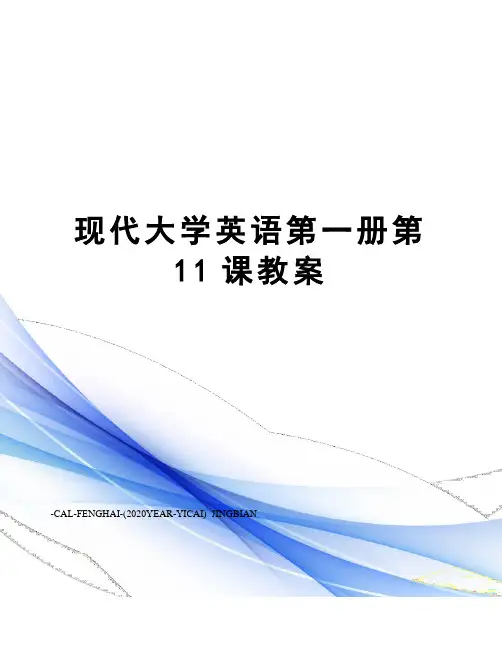
现代大学英语第一册第11课教案-CAL-FENGHAI-(2020YEAR-YICAI)_JINGBIANUnit 11 The Midnight VisitorBy Robert ArthurI. Warming-up Discussion1. In contrast to 007, what is the image of the secret agent called Ausable in The Midnight Visitor Try to describe him, please.007: young, strong, handsome, irresistible to women,Ausable: sloppy fat man, no threat to anyone, not even healthy, carries no guns,, he is no linguistic genius, lives in a hotel, communicates his comrades by ordinary telephone seems nothing mysterious but2. Being a secret agent so far away from the commonly accepted image, what is it that makes Ausable so uncommon? his wisdom.3.As the article pointed out, we are surrounded by many modern facilities. Did you ever benefit from any of the systemTell your classmates.4.Are the facilities mentioned in the article good or not according to your point of view?5.Are the facilities a kind of violation of your privacy?II. Phrases of Body Language1. to nod consent 点头表示同意2. to nod one's farewell 点头表示告别3. to nod as a sign of agreement or as a familiar greeting点头表示赞同或打招呼4. to hold one's head high 昂首挺胸(表示趾高气扬)5. to shake one's fist 挥动拳头(表示威胁)6. to shake one's head 摇头(表示不知道)7. to show a V sign 祝愿胜利或庆祝胜利8. to wink at a person 向某人眨眼睛9. to shrug one's shoulders 耸耸肩膀(表示冷淡或怀疑)10. to make a face 面部露出厌恶的表情11. to crook a finger 朝某人弯曲食指,是招人过来的意思212. to thumb one's nose 表示轻蔑或嘲弄(以大拇指按鼻,其余四指张开)13. to twiddle one's thumbs 无聊地绕动着两个大拇指,表示无所事事、懒散14. thumbs down 大拇指朝下,表示反对或拒绝的手势15. thumbs up 翘起大拇指,表示赞成或夸奖16. to thumb a lift 请求搭便车Text AnalysisI. Text GlimpseQuestions:1.What was Fowler’s first impression of Ausable?2. How did Fowler get his first thrilling experience of the day?3. How did Ausable deal with the situation?4. How did Ausable finally outwit Max?II. General AnalysisQuestions: How many parts can this text be divided into?Plot: Ausable appears helpless, but he gets rid of his deadly enemy without lifting a finger.Setting: a French hotel roomProtagonists: Ausable, Fowler, Max and a waiterStructure of the textPart 1 (para. 1- 5 ) about: Who Ausable is & why Fowler wants to see himPart 2 (para. 6-16 ) about: The unexpected visit of Ausable’s adversary(对手)Max Part 3 (para. 17-26) about: How Ausable outwits Max and makes him jump on the“balcony”.III. Detailed Analysis1. Making character sketches: physical appearance; how the person acts, talks, thinks and deals with person.2. Activities: 1) Retelling the text in your own words.2) Find words and phrases that can sum up our impressions of Ausable. Language understanding1. figure:1). symbol for a number He has an annual income of six figures.32). diagram The blackboard is covered with geometrical figures likesquares and triangles.3). human form: I saw a figure approaching in the darkness.She is now on a diet to keep her figure.4). person , esp. person of influencea great historical figure5) figure… out: calculate; think about until one understandsCan you figure out the total number?I can’t figure him out.2. risk:She is too sensible to take/run a risk when driving.We’ll take /run the risk of being late.He was determined to get there even at the risk of his life.v. risk+ n.risk+-ing To save that traveler, they had to risk getting caught in the storm.3. start n.[c]sudden movement of surprise, fear etc.He sat up with a start.The news gave him a start.startle vt. give a shock or surprise toShe was startled to see that man so pale.What startling news it was that the building caught fire!4. concerning: prep.This book deals with questions concerning C hina’s diplomatic policies. synonyms regardingwith reference towith respect to5. command:1). order The officer commanded his men to fire.The officer commanded that his men (should) fire.2). control; hold back c ommand oneself / one’s tempercommanding adj.He said in a commanding tone.He is now in a commanding position.6. blink: vt & vi. shut and open the eyes quicklyblink one’s eyes blink away one’s tearsblink the fact that… (fig) refuse to consider; ignore There is no denying the fact…47. gaze stare glance glimpsegaze (at): 尤指以赞赏、愉快、好奇或饶有兴趣的神态长时间地盯着看,常常达到出神的地步;stare (at): 尤指吃惊、恐惧、愤怒或无礼地瞪大眼睛目不转睛地看;glance: “看一眼” “扫视”,强调匆忙快速的动作过程;glimpse:“瞥见”,强调动作的偶然性和所见到事物的不充分、不全面。
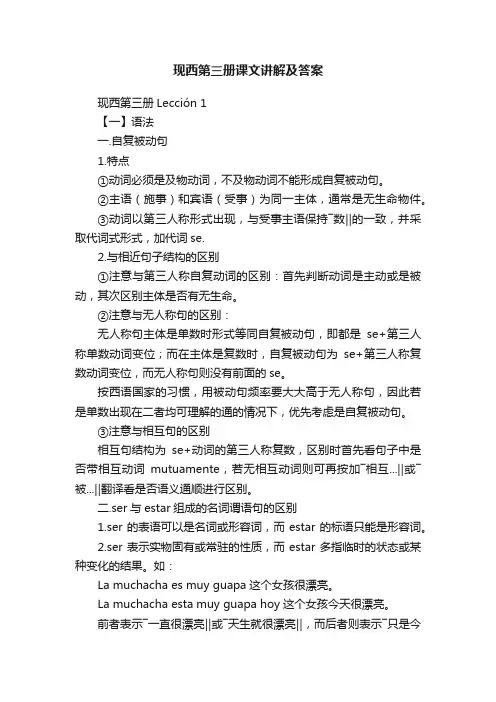
现西第三册课文讲解及答案现西第三册Lección 1【一】语法一.自复被动句1.特点①动词必须是及物动词,不及物动词不能形成自复被动句。
②主语(施事)和宾语(受事)为同一主体,通常是无生命物件。
③动词以第三人称形式出现,与受事主语保持―数‖的一致,并采取代词式形式,加代词se.2.与相近句子结构的区别①注意与第三人称自复动词的区别:首先判断动词是主动或是被动,其次区别主体是否有无生命。
②注意与无人称句的区别:无人称句主体是单数时形式等同自复被动句,即都是se+第三人称单数动词变位;而在主体是复数时,自复被动句为se+第三人称复数动词变位,而无人称句则没有前面的se。
按西语国家的习惯,用被动句频率要大大高于无人称句,因此若是单数出现在二者均可理解的通的情况下,优先考虑是自复被动句。
③注意与相互句的区别相互句结构为se+动词的第三人称复数,区别时首先看句子中是否带相互动词mutuamente,若无相互动词则可再按加―相互...‖或―被...‖翻译看是否语义通顺进行区别。
二.ser与estar组成的名词谓语句的区别1.ser的表语可以是名词或形容词,而estar的标语只能是形容词。
2.ser表示实物固有或常驻的性质,而estar多指临时的状态或某种变化的结果。
如:La muchacha es muy guapa这个女孩很漂亮。
La muchacha esta muy guapa hoy这个女孩今天很漂亮。
前者表示―一直很漂亮‖或―天生就很漂亮‖,而后者则表示―只是今天很漂亮,也许是经过了打扮才漂亮‖。
3.某些形容词放在ser或estar后含义不同。
如:El es listo他很聪明。
Todo esta listo 什么都弄停当了。
El es muy vivo他很活泼。
El todavía esta vivo他还活着。
【二】léxico词汇I.reunir(se)A.tr.聚集,汇集,积攒1.我(女)朋友想攒点钱买辆车。
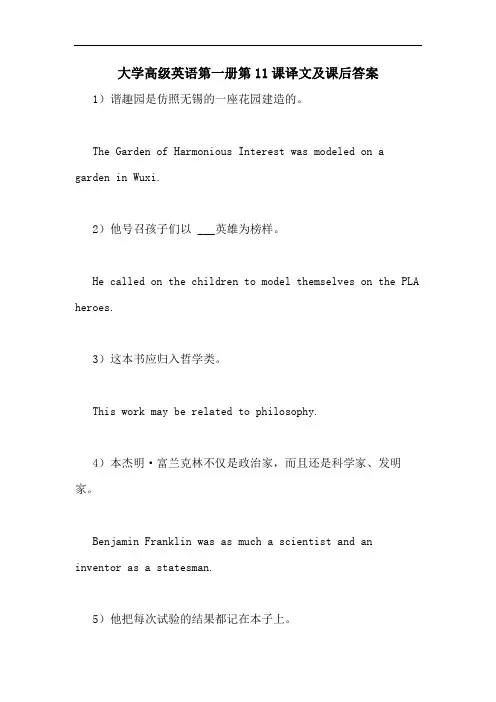
大学高级英语第一册第11课译文及课后答案1)谐趣园是仿照无锡的一座花园建造的。
The Garden of Harmonious Interest was modeled on a garden in Wuxi.2)他号召孩子们以 ___英雄为榜样。
He called on the children to model themselves on the PLA heroes.3)这本书应归入哲学类。
This work may be related to philosophy.4)本杰明·富兰克林不仅是政治家,而且还是科学家、发明家。
Benjamin Franklin was as much a scientist and an inventor as a statesman.5)他把每次试验的结果都记在本子上。
He set down all the findings of every experiment in his notebook.6)你能用简明的语言概括这首古诗的中心思想吗?Can you sum up the central idea of this ancient poem in plain terms?7)我们应不断地使自己的思想适应变化的情况。
We should constantly adapt our thinking to the changing conditions.8)年轻的士兵冻死在雪地里,手里还紧握着枪。
The young soldier was frozen to death in the snow, his hands still hanging on to a gun.9)该公司将为他们提供住宿和交通工具。
The said pany will furnishthem with lodging and transportation.10)车速限制在每小时55公里之内。
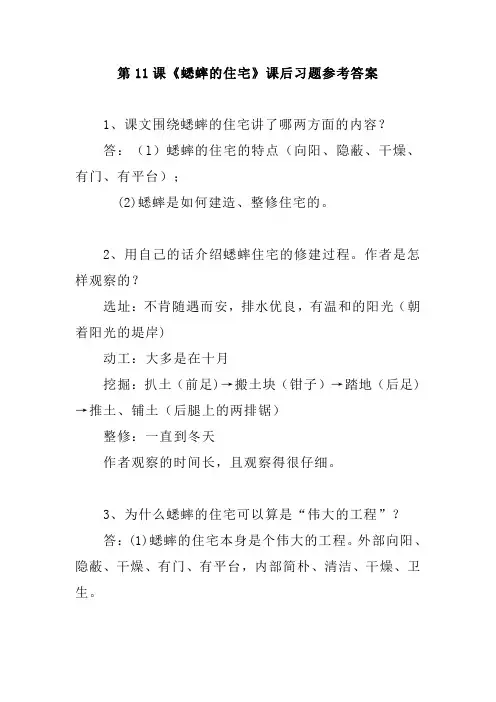
第11课《蟋蟀的住宅》课后习题参考答案1、课文围绕蟋蟀的住宅讲了哪两方面的内容?答:(l)蟋蟀的住宅的特点(向阳、隐蔽、干燥、有门、有平台);(2)蟋蟀是如何建造、整修住宅的。
2、用自己的话介绍蟋蟀住宅的修建过程。
作者是怎样观察的?选址:不肯随遇而安,排水优良,有温和的阳光(朝着阳光的堤岸)动工:大多是在十月挖掘:扒土(前足)→搬土块(钳子)→踏地(后足)→推土、铺土(后腿上的两排锯)整修:一直到冬天作者观察的时间长,且观察得很仔细。
3、为什么蟋蟀的住宅可以算是“伟大的工程”?答:(1)蟋蟀的住宅本身是个伟大的工程。
外部向阳、隐蔽、干燥、有门、有平台,内部简朴、清洁、干燥、卫生。
(2)蟋蟀的住宅耗时耗力,从十月一直到冬天,都在建造、整修。
(3)蟋蟀用来修建这座住宅的工具是那样柔弱,那样简单,而修建住宅的工程这么庞大。
从这巨大的反差中,我们可以体会到蟋蟀建造出这样的住宅简直是一个奇迹,所以蟋蟀的住宅可以算是“伟大的工程”4、课文把蟋蟀比作人,把蟋蟀的巢穴比作人的住宅,说说这样写的好处。
读下面的片段,想想在表达方法上与课文有什么不同。
蟋蟀体形微扁,头部圆形,触角长、呈线状。
有翅时,翅平叠于躯体上。
多数体色呈褐色或黑色,深浅不一。
雄虫利用位于前翅基部的脊产生求偶鸣声。
多数雌性的产卵器很显著,呈筒状或针状。
作者把蟋蟀比作(人),把蟋蟀的巢穴比作(人的住宅)。
这样写的作用是(语言更加形象生动,风趣幽默,更能吸引读者)。
课文主要采用拟人化的写法,本来比较枯燥无味的内容变得生动形象,语言更加风趣幽默,使读者产生亲切之感,引起阅读的兴趣。
而这个片段则是采用直接说明的方法具体地介绍蟋蟀的外形、体色、发声器、产卵器。
语言准确,但没有课文那么生动有趣。

【关键字】精品现西第四册Lección 1【一】语法本课主要是学习动词虚拟式变位、否定命令式的用法、副动词的构成及用法,相对还算简单,请大家参考现西第四册P55。
【二】léxico词汇I.considerar(se)C.prnl.自认为1.No me considero la persona indicada para hacer eso.我不认为我是适合做那事的人。
Indicada合适的。
2.Todavía no se consideraba el hombre más feliz del mundo aunque tenía todo lo que deseaba.虽然这个人拥有了他想要的一切,但他仍不认为是世上最幸福的人。
II.hablar重点掌握:1.做及物动词时直接补语只能是“语言”。
2.掌握hablar con alguien de algo“与某人谈论某事”的用法,IV.recordarB.tr.提醒1.Recuérdale que me traiga el libro.你提醒一下他把书给我带来。
Traiga主语是“他”,主句与从句主语不一致,使用了“虚拟式”。
2.Vengo a recordarte que la velada comenzaráa las siete en punto.我来提醒你晚会7点整开始。
comenzará将来时变位。
【三】Texto 课文No hagas eso别那样做I.Los hábitos varían según cada cultura y pueblo. Comportamientos que①se consideran normales②en China,pueden resultar③chocantes en otros países. Supongamos que quieres ir a España o a otros países de habla④española;entonces lee⑤con atención estos consejos.每种文化和每个地区是风俗习惯是不同的。
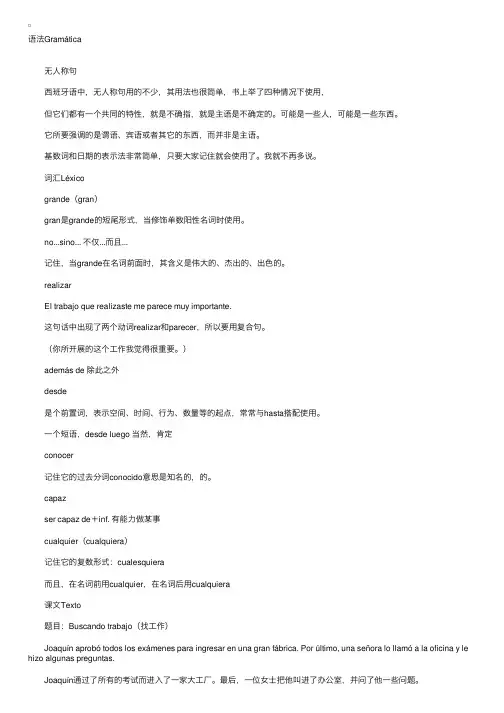
语法Gramática ⽆⼈称句 西班⽛语中,⽆⼈称句⽤的不少,其⽤法也很简单,书上举了四种情况下使⽤, 但它们都有⼀个共同的特性,就是不确指,就是主语是不确定的。
可能是⼀些⼈,可能是⼀些东西。
它所要强调的是谓语、宾语或者其它的东西,⽽并⾮是主语。
基数词和⽇期的表⽰法⾮常简单,只要⼤家记住就会使⽤了。
我就不再多说。
词汇Léxico grande(gran) gran是grande的短尾形式,当修饰单数阳性名词时使⽤。
no...sino... 不仅...⽽且... 记住,当grande在名词前⾯时,其含义是伟⼤的、杰出的、出⾊的。
realizar El trabajo que realizaste me parece muy importante. 这句话中出现了两个动词realizar和parecer,所以要⽤复合句。
(你所开展的这个⼯作我觉得很重要。
) además de 除此之外 desde 是个前置词,表⽰空间、时间、⾏为、数量等的起点,常常与hasta搭配使⽤。
⼀个短语,desde luego 当然,肯定 conocer 记住它的过去分词conocido意思是知名的,的。
capaz ser capaz de+inf. 有能⼒做某事 cualquier(cualquiera) 记住它的复数形式:cualesquiera ⽽且,在名词前⽤cualquier,在名词后⽤cualquiera 课⽂Texto 题⽬:Buscando trabajo(找⼯作) Joaquín aprobó todos los exámenes para ingresar en una gran fábrica. Por último, una señora lo llamó a la oficina y le hizo algunas preguntas. Joaquín通过了所有的考试⽽进⼊了⼀家⼤⼯⼚。
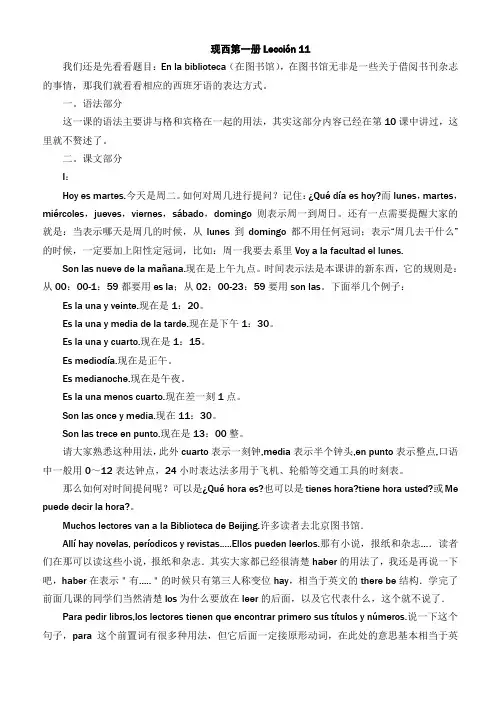
现西第一册Lección 11我们还是先看看题目:En la biblioteca(在图书馆),在图书馆无非是一些关于借阅书刊杂志的事情,那我们就看看相应的西班牙语的表达方式。
一。
语法部分这一课的语法主要讲与格和宾格在一起的用法,其实这部分内容已经在第10课中讲过,这里就不赘述了。
二。
课文部分I:Hoy es martes.今天是周二。
如何对周几进行提问?记住:¿Qué día es hoy?而lunes,martes,miércoles,jueves,viernes,sábado,domingo则表示周一到周日。
还有一点需要提醒大家的就是:当表示哪天是周几的时候,从lunes到domingo都不用任何冠词;表示“周几去干什么”的时候,一定要加上阳性定冠词,比如:周一我要去系里Voy a la facultad el lunes.Son las nueve de la mañana.现在是上午九点。
时间表示法是本课讲的新东西,它的规则是:从00:00-1:59都要用es la;从02:00-23:59要用son las。
下面举几个例子:Es la una y veinte.现在是1:20。
Es la una y media de la tarde.现在是下午1:30。
Es la una y cuarto.现在是1:15。
Es mediodía.现在是正午。
Es medianoche.现在是午夜。
Es la una menos cuarto.现在差一刻1点。
Son las once y media.现在11:30。
Son las trece en punto.现在是13:00整。
请大家熟悉这种用法,此外cuarto表示一刻钟,media表示半个钟头,en punto表示整点,口语中一般用0~12表达钟点,24小时表达法多用于飞机、轮船等交通工具的时刻表。
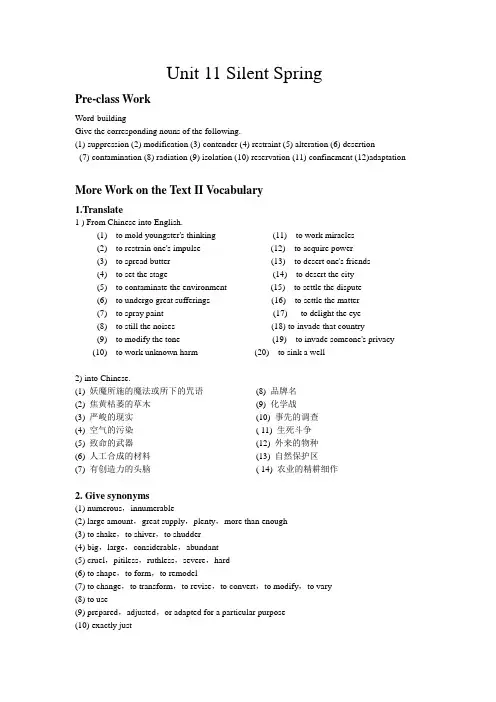
Unit 11 Silent SpringPre-class WorkWord-buildingGive the corresponding nouns of the following.(1)suppression (2) modification (3) contender (4) restraint (5) alteration (6) desertion(7) contamination (8) radiation (9) isolation (10) reservation (11) confinement (12)adaptationMore Work on the Text II Vocabulary1.Translate1 ) From Chinese into English.(1) to mold youngster's thinking (11) to work miracles(2) to restrain one's impulse (12) to acquire power(3) to spread butter (13) to desert one's friends(4) to set the stage (14) to desert the city(5) to contaminate the environment (15) to settle the dispute(6) to undergo great sufferings (16) to settle the matter(7) to spray paint (17) to delight the eye(8) to still the noises (18) to invade that country(9) to modify the tone (19) to invade someone's privacy(10) to work unknown harm (20) to sink a well2) into Chinese.(1) 妖魔所施的魔法或所下的咒语(8) 品牌名(2) 焦黄枯萎的草木(9) 化学战(3) 严峻的现实(10) 事先的调查(4) 空气的污染( 11) 生死斗争(5) 致命的武器(12) 外来的物种(6) 人工合成的材料(13) 自然保护区(7) 有创造力的头脑( 14) 农业的精耕细作2. Give synonyms(1) numerous,innumerable(2) large amount,great supply,plenty,more than enough(3) to shake,to shiver,to shudder(4) big,large,considerable,abundant(5) cruel,pitiless,ruthless,severe,hard(6) to shape,to form,to remodel(7) to change,to transform,to revise,to convert,to modify,to vary(8) to use(9) prepared,adjusted,or adapted for a particular purpose(10) exactly just(11) to experience,to go through,to endure(12) useless,vain,unsuccessful(13) artificial, man-made, unnatural(14) to rise, to appear, to surface, to come up, to come into view(15) contamination(16) deadly, fatal(17) attack(18) evil, wicked, threatening, frightening(19) to alter, to change, to adjust, to adapt3. Translate1) Building a house is no joking matter. You have to check carefully at every step.2) His troops successfully checked the advance of the enemy.3) I really wanted to refute his arguments, but I checked myself because I thought it was not the right occasion.4) Are you sure that we can trust him? I think we ought to check it up on him.5) Our original intention was to check into a hotel, but our friend insisted that we should stay at his p!ace.6) Rachel Carson devoted all her life to the cause of environmental protection.7) They are devoted to each other. Nothing can separate them.8) He devoted a whole chapter to this subject in his recently published book'9) This reservoir can hold two billion cubic meters of water.10) At that time, we all held our breath. You could hear a needle drop.11) Diogenes held the view that the property people hold does not really being happiness.12) He did not intend his discovery to be used for war purposes.13) These colorful clothes are intended for the African market.14) Today there are so many cars in the streets. I'd rather walk than drive. It's quicker.15) He would rather die standing on his feet than live on his knees.16) You can use my bike , or rather my wife's bike.17) I hear that the movie is intended to be a hit. But I must confess I think it is rather silly.4.1) A. 4) D. 7) A. 10) D. 13) A.2) B. 5) C. 8) B. 11) A. 14) D.3) A. 6) B. 9) A. 12) B. 15)C.5.1) a piece of news 2) a piece of information3) a newspaper/paper 20) a jacket4) a slip/piece of paper 21) a suit (of clothes)5) a piece of advice/a proposal (suggestion) 22) a piece of land/a plot6) a song 23) a piece/bar of soap7) a piece of music 24) a piece of furniture8) a stone/a rock 25) a rope9) a piece of wood 26) a hair10) a tree 27) two fish11) a lump of sugar/a piece of candy 28) three sheep12) a piece of evidence 29) a lot of (lots of, much, a great deal of, a13) a loaf of bread large amount of, a large quantity of, large14) a piece/slice of bread quantities of) money15) a job 30) a lot of (lots of, many, a great number16) a means of, large numbers of) problems17) a fish 31) some (a little, a bit of) time18) a piece of cloth 32) some (a few, several) deer19) a piece of clothing/a garment (dress, coat)B1) a pair of (shoes, glasses, gloves etc) 9) a blade of (grass)2) a drop of (water, wine' oil etc) 10) a flock of (birds, sheep)3) a set of (teacups, books etc) 11) a pile of (books, stones, melons)4) a bunch of (keys, bananas, people .etc) 12) a roll of (film, toilet paper)5) a glass of (beer, wine, milk etc) 13) a swarm of (bees, flies)6) a cup of (tea, coffee etc) 14) a heap of (stones, money)7) a pack of (cigarettes, wolves etc) 15) a cluster of (flowers, students)8) a grain of (rice, salt, sand etc) 16) a herd of (cattle)6.1) (1) exchange (2) changed (3) exchanged, changed(4) an exchange, an exchange2) (1) except (2) Besides (3) beside (4) except3) (1) used to, is used to ( 2) am used to (3) used to4) (1) shaking (2) shivering (3) trembled/shook (4) trembled7.1) 你上月的电话费(bill账单)付了吗?2) 那个法案(bill法案)在国会里被否决了。
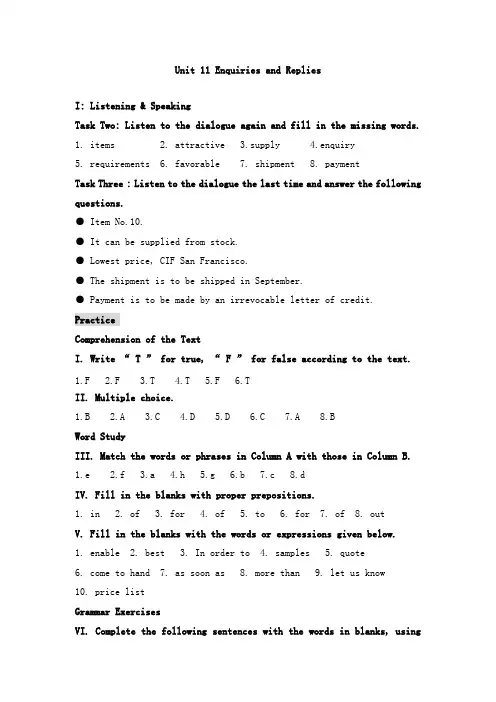
Unit 11 Enquiries and RepliesI: Listening & SpeakingTask Two: Listen to the dialogue again and fill in the missing words.1. items2. attractive3.supply4.enquiry5. requirements6. favorable7. shipment8. paymentTask Three : Listen to the dialogue the last time and answer the following questions.● Item No.10.● It can be supplied from stock.● Lowest price, CIF San Francisco.● The shipment is to be shipped in September.● Payment is to be made by an irrevocable letter of credit.PracticeComprehension of the TextI. Write “ T ” for true, “ F ” for false according to the text.1.F2.F3.T4.T5.F6.TII. Multiple choice.1.B2.A3.C4.D5.D6.C7.A8.BWord StudyIII. Match the words or phrases in Column A with those in Column B.1.e2.f3.a4.h5.g6.b7.c8.dIV. Fill in the blanks with proper prepositions.1. in2. of3. for4. of5. to6. for7. of8. outV. Fill in the blanks with the words or expressions given below.1. enable2. best3. In order to4. samples5. quote6. come to hand7. as soon as8. more than9. let us know 10. price listGrammar ExercisesVI. Complete the following sentences with the words in blanks, usingtenses.1. I was having a business talk with some foreign businessmen2. she would visit our company3. we had exported 1000 computers4. Have you been to China Import and Export Fair5. Hardly had he arrived6. He would meet a foreign guest7. He was then learning to type8. Great changes have taken place in ChinaVII. Choose the best answer.1. C2. D3. C4. A5. C6. B7. B8. C9. A 10. DBusiness Knowledge ExtensionsVIII. Translate the following sentences into Chinese.1. 我们对贵方自行车感兴趣。
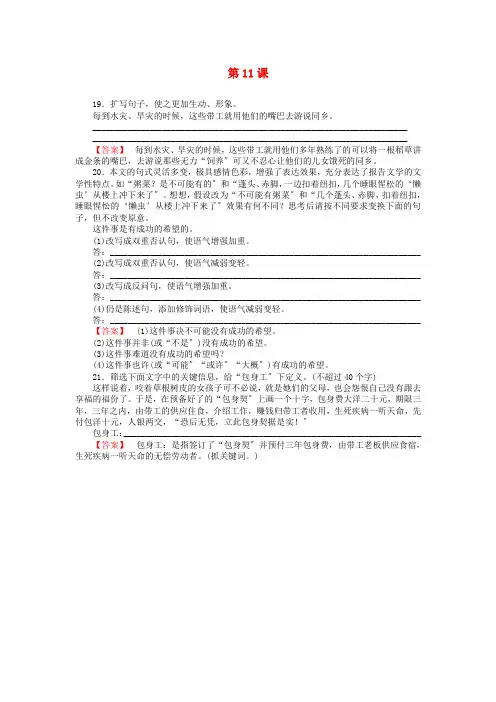
第11课19.扩写句子,使之更加生动、形象。
每到水灾、旱灾的时候,这些带工就用他们的嘴巴去游说同乡。
________________________________________________________________________ ________________________________________________________________________ 【答案】每到水灾、旱灾的时候,这些带工就用他们多年熟练了的可以将一根稻草讲成金条的嘴巴,去游说那些无力“饲养〞可又不忍心让他们的儿女饿死的同乡。
20.本文的句式灵活多变,极具感情色彩,增强了表达效果,充分表达了报告文学的文学性特点。
如“粥菜?是不可能有的〞和“蓬头、赤脚,一边扣着纽扣,几个睡眼惺松的‘懒虫’从楼上冲下来了〞。
想想,假设改为“不可能有粥菜〞和“几个蓬头、赤脚,扣着纽扣,睡眼惺忪的‘懒虫’从楼上冲下来了〞效果有何不同?思考后请按不同要求变换下面的句子,但不改变原意。
这件事是有成功的希望的。
(1)改写成双重否认句,使语气增强加重。
答:_______________________________________________________________________(2)改写成双重否认句,使语气减弱变轻。
答:_______________________________________________________________________(3)改写成反问句,使语气增强加重。
答:_______________________________________________________________________(4)仍是陈述句,添加修饰词语,使语气减弱变轻。
答:_______________________________________________________________________ 【答案】(1)这件事决不可能没有成功的希望。
新生命第十一课的讲解《新生命第十一课讲解指南》新生命的课程就像是一场奇妙的旅程,每一课都有独特的风景和宝藏。
这第十一课啊,那也是充满了特别的意义。
咱先来说说这课里可能涉及到的对新生命成长阶段的理解吧。
新生命就像一颗刚种下的种子,从土里冒尖开始,它就不断地在变化。
在这个阶段,它可能是娇嫩的小芽,脆弱得很,就像小婴儿一样,一点点的风吹草动都可能让它受到影响。
你看啊,小婴儿刚生下来的时候,那哭声都细弱得很,整个小身子软绵绵的,像个小团子。
这就告诉我们要像呵护小芽一样呵护新生命,给它合适的环境,合适的营养。
那在新生命第十一课里,也许会提到新生命的认知发展。
这就好比是小芽慢慢长大,开始探索周围的世界。
小娃子从只会简单地看东西,到后来能伸手去抓,这就是他们认知世界的开始。
就像小芽朝着有阳光的地方生长,小娃子也是朝着新鲜有趣的事物去探索。
他们会对颜色鲜艳的东西感兴趣,会对发出声音的东西好奇。
这时候家长或者教育者的角色呢?就像是园丁,得引导着小芽往健康的方向长,引导着小娃子去认识好的东西。
比如说,给小娃子一些色彩鲜艳的、安全的小玩具,就像给小芽合适的肥料一样。
情感的发展也是这一课的重点内容吧。
新生命从最初只知道满足生理需求,饿了哭、困了闹,到后来有了丰富的情感。
这就像小芽从只需要水分和阳光,到后来会受到周围其他植物、小动物的影响。
小娃子开始会笑,会对着熟悉的人表现出亲昵,这是多么神奇的变化啊!这就如同花朵慢慢绽放出美丽的花瓣一样,新生命的情感世界也在一点点地展开。
那我们该怎么做呢?我们要像温暖的阳光一样,去回应他们的情感。
当小娃子对着我们笑的时候,我们也要开心地回应,这就像阳光照耀花朵,让花朵开得更灿烂。
还有新生命的社交能力的萌芽啊。
新生命在成长过程中,开始和周围的人有互动,这就像是小芽开始和周围的植物分享空间。
小娃子从和家人的简单互动,到慢慢可能会和小伙伴一起玩耍。
这是个循序渐进的过程。
他们可能一开始只是好奇地看着其他小伙伴,然后慢慢地会去模仿,再到一起分享小玩具。
第十课UNIDAD101.交际FUNCIÓN COMUNICATIV A☆如何征询意见☆如何发表评论2.语法GRAMÁTICA☆命令式第一人称复数和第二人称复数的亲昵式和礼貌式(II);☆否定命令式☆动词ESTAR,IR和SER的虚拟式现在时变位;☆关系代词QUE与定语从句;☆副动词与动词短语ESTAR+GERUNDIO☆动词短语QUERER+INF.☆不规则动词CONOCER,CONTAR,ENTENDER,JUGAR和REGAR的陈述式现在时变位;3.社会文化知识CONOCIMIENTO SOCIOCULTURAL☆世界上有几个美洲练习EJERCICIOSII.请听录音,口头回答关于课文的问题(Escuche las preguntas sobre el texto y contéstelas oralmente en español.)(录音)1.Los alumnos ya llevan más de dos meses en contacto con el profesor.2.Los alumnos quieren saber quépiensa el profesor de ellos.También quieren hablar conél sobre los estudios de español.3.Sí,el profesor también quiere hablar con los alumnos.4.En un comienzo,el profesor les dice que son unos chicos sanos,alegres,bieneducados,con ganas de conocer cosas y muy aplicados en el estudio.5.Lo que más les interesa saber a los alumnos son los defectos que tienen en el estudio.6.Según el profesor,el problema que mayor importancia tiene para los alumnos es la pronunciación. pronunciación es muy importante porque una palabra mal pronunciada puede significar otra cosa.8.Los niños no pueden hacer mucho ruido porque la gente mayor estádescansando.9.Los niños quieren ir a buscar al abuelo porqueél puede contarles un cuento.10.No,según la madre,los niños no pueden ir a buscar a su abuelo porque no seencuentra bien. madre dice que los niños no pueden ir a jugar a la calle porque es muypeligroso.12.No,los niños no pueden ver la tele porque siempre la ponen a todo volumen ymolestan mucho a todo el mundo.13.Si los niños van a jugar al jardín,se van a ensuciar los zapatos y la ropa.14.Les queda todavía la biblioteca.Pero tampoco(也不)pueden ir allíporque lamadre la va a barrer.15.Los niños no comprenden por quélos mayores siempre les dicen:¡No hagáis esto!¡No hagáis lo otroIV.请根据情况将括号中的原形动词变为命令式(肯定或否定)或动词短语ESTAR+副动词(Rellene los espacios en blanco con los verbos entre paréntesis conjugándolos en modo imperativo[afirmativo o negativo]o como parte de la perífrasis ESTAR+GERUNDIO,según convenga.)1.–Oye,Ana,alguien estállamando a la puerta.–Lo sé,pero,por favor ve túa ver quién es.Yo estoy ocupada.2.–Luis,¿dónde están los niños?–Están jugando en el jardín.–La comida va a estar lista pronto.Pon la mesa y llámalos a comer.3.–Buenas tardes,señor.Estoy buscando algunos libros sobre China.pero noencuentro ninguno.–Venga conmigo.Yo le voy a decir dónde están.–Muchas gracias.Es usted muy amable.4.(Luisa habla por teléfono con su padre.)–Hola,papá,¿estátambién mamáen casa?¿Quéestáis haciendo?–Yo estoy viendo la televisión y tu mamá,haciendo la limpieza.–Hace un buen día.Vamos a dar un paseo por el Parque del Norte.Venid, rápido.Os estoy esperando.–Bueno,pero¿dónde nos estás esperando?–En la puerta del parque.No me hagáis esperar mucho,¿eh?5.(Por teléfono)Javier:¿Aló?,¿hablo con María?María:Sí.¿Eres tú,Javier?¡Quéalegría oírte después de tanto tiempo.Javier:Es verdad,mucho tiempo.¿Quétal?¿Cómo estás?Cuéntame un poco de tu vida.¿Quéestás haciendo ahora?María:Trabajo de recepcionista en un hotel.¿Y tú?¿Todavía estudiando?Javier:Sí,e stoy haciendo el doctorado.María:¡No me digas,¡y dentro de poco,doctor!Eso hay que celebrarlo.Ven a buscarme esta noche.Te invito a cenar.6.Soledad:Joaquín,devuélveme el libro.Lo necesito para un trabajo.Joaquín:Pero¡todavía lo estoy leyendo!Soledad:Entonces,olvídalo..7.Madre:Hija,la abuela estádescansando.No la molestes.Hija:No la estoy molestando,pero ella dice que tiene sed.Madre:Entonces,llévale un vaso de agua.8.Profesor:Chicos,saquen de aquíesas sillas,*están estorbando.Un alumno:¿Todas?Profesor:No,retiren solo estas tres.Lléve nlas y pónganlas junto a la mesa.9.Camarero:Señores,no se sienten en aquellas sillas,que están sucias.Ahoramismo las voy a limpiar.Cliente:Pues límpialas pronto,o dinos dónde podemos sentarnos.Camarero:Aquí,señores.S iéntense,por favor,en estas sillas nuevas.10.Luisa:José,si no te sientes bien,no te levantes.José:Eso es lo que voy a hacer,pero tráeme una revista.Si no puedo hacer otra cosa,por lo menos pienso leer algo.Luisa:Lee esta novela que acabo de comprar.Pero ponte una camiseta,que hace frío(冷)。
新版现西第一册课后答案一个学期快要结束了,作为现西第一册的学习者,大家应该都深有体会。
面对那些复杂的语法表格,还有那难以理解的课文翻译,我们之前往往需要互相讨论、请教老师,才能完成作业。
而现在,新版现西第一册课后答案面世了。
这份答案让我们的学习变得更加便捷,节约了我们宝贵的时间。
首先,我们需要了解为什么会有新版现西第一册课后答案。
对于课本答案的存在,一些人会认为这些答案需要帮助学生完成作业,检查自己已有的知识掌握,以及了解自己还需要提高的地方。
但是另一些人,则会认为这些答案会让学生变得懒惰,失去解题的能力。
两种观点均有一定道理,然而我们不得不承认,时代在不断进步,我们需要拥抱这些新变化,并且合理利用。
因此,新版现西第一册课后答案能够为我们打破语言学习中的困境带来很大的帮助,让我们更好地学习和提升自己。
那么新版现西第一册课后答案有什么具体的帮助呢?从以下几个方面来进行分析:1. 提高效率我们都知道,完成一份语言课本的作业往往需要很多的时间和精力,特别是对于那些语言基础比较薄弱的人来说,一些深奥的语法和翻译难度非常大的课文,更是让我们头痛不已。
这时候,新版现西第一册课后答案就能够帮我们节约不少的时间。
我们可以先自己尝试做出来,或者尝试用其他工具查找相关知识,若是还有问题,可以直接查看答案,这样可以更轻松地完成作业并且提高效率。
2. 加深记忆我们知道,提高语言掌握的关键就是大量的练习。
而对于汉语学习者来说,如果一直在看中文答案,不优先思考自己的答案的话,是很难从语言习得的角度来加深记忆和理解的。
可以这样做,找到自己的答案进行对比,逐渐纠错并完善,让自己在更深刻掌握所学知识的同时,加深记忆。
3. 自行检验、纠错使用现西第一册课后答案,最大的意义在于检测自己所学知识的掌握情况,并且能找出自己答案中的错误点或经验不足的地方。
只有通过纠正这些错误点,不断调整自己的语言学习策略,我们才能更快、更好地掌握所需的语言知识。
. 科学家们大致同意地球变暖是一个事实,但是其成因目前还在热烈争论中.不少人认为,如果我们把现有证据都放在一起,就可得出结论,这是人类活动造成.但另外有些人认为我们还要进一步研究这个问题,他们认为自然地力量起码有着同等地重要性.. , , . 文档来自于网络搜索. 他把他地一生都献给了水利工程.他是少数几个最早看到在这里建大坝可能给我们造成多大麻烦地科学家中地一位.文档来自于网络搜索. . 文档来自于网络搜索. 那些同情国际恐怖主义地人从一个不同地前提出发来看待这一问题.他们相信,为了达到目地可以不择手段.但我强烈反对这种观点.我认为任何借口都不能成为冷血谋杀无辜地妇女、儿童和老人作辩护.文档来自于网络搜索. . . . 文档来自于网络搜索. 有民间非政府组织再起作用是件好事.在一个多元化地世界里,人们地观点总是不同地.反对者不但应该被容许,而且还应该得到尊重和鼓励.这么做对我们自己也有好处.文档来自于网络搜索. , ’ . , .文档来自于网络搜索. 政府地过度投资意味着很多国有银行地贷款不可能得到偿还.这些呆账最后就会导致金融危机.’ .文档来自于网络搜索. 现在有一种提供给大学生地特别贷款.哪些无法交纳学费地学生都可以从中获益.. ’ .文档来自于网络搜索. 他在结束讲话是说,他们一结束调查就向安理会报告. 他坚信,企图用大规模地屠杀来维持一个国家地统治注定是要失败地.文档来自于网络搜索.文档来自于网络搜索. 他将经香港飞往印度去和印度政府签订一个新地知识产权保护协议..文档来自于网络搜索. 根据这些理由,我们只能得出他们在蓄意制造事端地结论,所以我们决定立即召回大使以示抗议., . , .文档来自于网络搜索英雄是具有非凡品质地人.. (: .)文档来自于网络搜索名流是因媒体炒作而出名地那些人..文档来自于网络搜索互联网是一个能把全世界地计算机连在一起地系统..文档来自于网络搜索欧阳教授说好教师是那种竭尽所能,使学生不依赖自己地人.\ \ .文档来自于网络搜索.不能共患难地()朋友适当你一有困难就立即抛弃你地那种人.. 文档来自于网络搜索.经济学是一门被定义为研究商品和服务地生产、分配和消费地社会科学..文档来自于网络搜索.一个空想革命家是职高谈革命却不将之付诸实践地人.’ .文档来自于网络搜索.国际货币基金组织是联合国内地一个涉及贸易和经济发展地机构..文档来自于网络搜索.闪盘和盘是一个能用来存储从电脑获取地资料并能呢个讲起移动到另一个电脑上地小设备..文档来自于网络搜索写微博是一种在互联网上定期发送短信息、照片或视频使人们不断了解你地活动和思想地行为., .文档来自于网络搜索要了解一种文化,学习艺术史不失为一种好办法,比上通史课学到地可能更多.最典型地历史课程重点都放在政治、经济和战争方面,而艺术史地侧重点不仅仅是这些,因为艺术不仅反映人们地政治是非观,还反映人们地宗教信仰、感情以及思想活动.此外,艺术还能提供有关我们先辈们地,或是不同与哦哦们地那些民族地日常生活用品地信息. 简言之,艺术表现出时代和地域地重要特征,艺术明显比大多数历史书更能加深我们对这些特征地理解.文档来自于网络搜索历史书向我们展示地是一个国家政治生活地客观信息,但不触及人们地观点.相反,艺术是主观地,他能表达出个人地、带有感情色彩地历史观.文档来自于网络搜索。
Unidad11
练习EJERCICIOS
II.先听整句录音,然后录音者会重复句中的某些单词或词组,请针对它们提问(Escuche primero la oración entera y luego la repetición de algunos vocablos o grupos de vocablos extraídos de ella.Formule preguntas concernientes a estos.)(录音)
1.¿A quéclase de familia pertenece Raquel?
2.¿Cuántos años tiene un tío abuelo de Raquel?
3.¿Cómo son varios parientes de Raquel?
4.¿Cómo son todos los jóvenes de la familia de Raquel?
5.¿Cuántos años supera la bisabuela?
6.¿Quiénes la visitan con frecuencia y conversan con ella?
7.¿Cómo habla la anciana?
8.¿Por quéa la anciana le gusta hablar con Raquel?
9.¿A quéviene esta chica?
10.¿Cuántos son en la familia de Lucía?
III.请选择括号里的词填空(Rellene los espacios en blanco con una de las palabras entre paréntesis.)
1.–Es verdad que Luis es mayor que su hermano
–Sí.Luis tiene30años y su hermano,28.
2.Estamos buscando secretaria.Tiene que ser mayor de35años y menor de40.
3.–Tu padre tiene ya sesenta años,pero es fuerte como roble.
–Sí.Aparenta tener menos edad de la que tiene.
4.Pedro y Fernando son mis sobrinos.Pedro es solo un año mayor que Fernando, pero es mucho más alto que este.
5.–¿Sabes?Tengo muchos parientes longevos.Una tía abuela mía tiene noventa y cinco años.
–Un tío abuelo mío es todavía mucho mayor:tiene noventa y nueve años.
6.–¿Son de la misma edad los estudiantes?
–No.Por lo general,unos tienen uno o dos años más que otros.
7.Mucha gente estácomprando por Internet porque asítienen más tiempo para hacer otras cosas.
8.¿Sabes por quéno encuentras lo que necesitas?Muy sencillo:porque eres muy
desordenado.
9.Profesora,esta lección es muy difícil porque en ella hay muchas palabras que no
conozco.
10.--Carlos tiene una hermana dieciocho años menor queél.
--Lo sé:él tiene treinta años y ella va a cumplir doce este mes.
1。